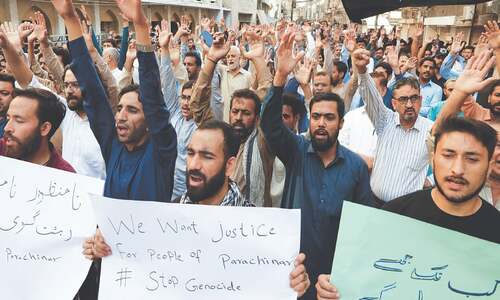KARACHI: The Sindh Environmental Protection Agency (Sepa) will ask the DHA City managers to provide complete details of its ongoing and future projects and carry out a cumulative impact assessment study.
This assurance came from Sepa during a public hearing held on Tuesday where they were quizzed over a lack of information about the DHA City projects.
The public hearing pertained to the environmental impact study of Shaukat Khanum Memorial Cancer Hospital and Research Centre (SKMCHRC) to be built at the Healthcare City, part of DHA City, in Gadap Town.
Public hearing about environmental impact study of Rs4.5bn Shaukat Khanum cancer hospital project held
Located near M-9, the project is estimated to cost Rs4.5 billion. It’s planned to get operational by 2021 as a 50-bedded facility and gradually have 400 beds for in-house patients.
The programme started off with a briefing on the hospital project. Zahid Hashmi, representing the hospital, said that it would be a third such facility by the Shaukat Khanum Memorial Trust in the country, which would act as a model institution for treatment of cancer patients in the country’s southern region.
“The project would be a state-of-the-art facility and would get accreditation by the Joint Commission International, one of the world’s leading patient safety organisations,” he said.
At present, there were only three hospitals in the country with JCI accreditation and SKMCHRC Lahore was one of them, he added.
Sharing project details, he said the hospital consisting of a basement and ground-plus-six floors would be spread over 20 acres and developed in three stages.
“The hospital will be equipped with the latest cancer care technology, including radiation bunkers fitted with linear accelerators for radiotherapy and nuclear medicine,” he said.
Giving a presentation on the project’s EIA study conducted by Global Environmental Management Services Pvt Ltd, Syeda Ibtasama Khatoon, representing the consultant, informed the audience that internationally reputed firms were being involved in its building and engineering design and its construction would also be supervised by experts.
“The hospital would have its own underground septic tank from where waste would be discharged into the DHA City sewage channels. Water requirement is estimated to be 12,000 gallons daily which would be met through supplies from the Karachi Water and Sewerage Board, DHA City as well as groundwater,” she said.
On the project’s environmental impact, it was pointed out that the proposed project site had “low abundance of flora and fauna, so its ecological impact is also low, which made the site ideal for constructing the facility.
“The proposed project won’t have any long-term impacts if activities are undertaken as suggested in this EIA report,” said Ms Khatoon.
Her presentation was followed by a question-answer session, which began with a Sepa official raising concerns over patient access to the hospital and disposal of refuse, including nuclear waste.
Responding to the concerns, Naved Zaheer, director of the Engineering Consultants International Ltd (ECIL), responsible for the project’s detailed engineering design and construction supervision, said that there would be a separate access for patients.
“There would be on-site incinerators and a waste treatment plant, separate from the one to be built by DHA City, whereas nuclear waste would be handled as per the Pakistan Nuclear Regulatory Authority guidelines,” he said.
The ECIL also specialised in healthcare design and the company had to its credit several hospitals in Saudi Arabia, the UAE, Egypt, Yemen and Pakistan, he added.
He rejected the possibility of any emergency involving nuclear waste leakage and said that radiation activity undertaken at such health facilities were of very low intensity and waste was handled as per the guidelines.
During the session, Sepa officials admitted that they didn’t have knowledge of that particular project when they approved the EIA study of DHA City in 2011.
“At that time, plots for residential, commercial and amenity purposes were only earmarked and investors came later in the picture,” said Imran Sabir, representing Sepa.
Replying to concerns about the fast-paced infrastructural developments in DHA City and how they would impact the environment, the communities living in surrounding areas and affect Karachi’ water resources in coming years, Naeem Mughal, additional director general of Sepa, assured the audience that the agency would ensure compliance with environmental and hospital management rules and regulations in the project/s.
“We will have a meeting with DHA City managers and seek complete details of their ongoing and future projects. We will ask them to submit their updated master plan as well as carry out a cumulative impact assessment of the whole project,” he said.
Dr Viqar Hussain, a senior geologist and consultant, urged Sepa to ensure that DHA City must evolve a plan for waste-water treatment and recycling.
Concern over the absence of DHA City’s representation was also raised.
Published in Dawn, January 16th, 2019
















































